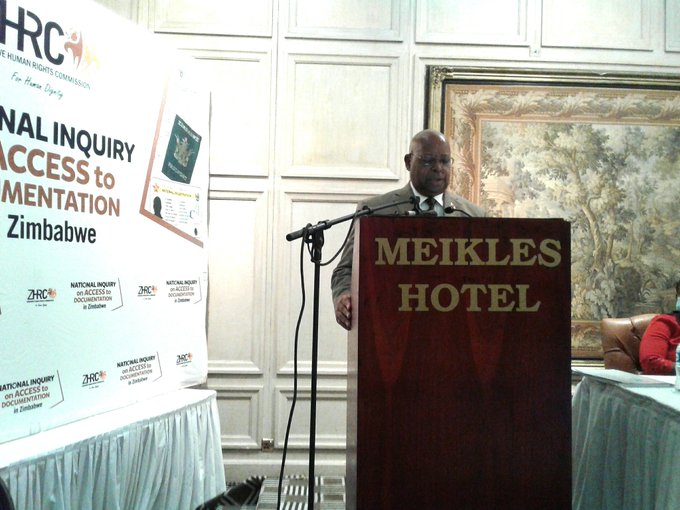Hon Advocate Jacob F. Mudenda, the Speaker of the National Assembly has said the lack of access to personal identity documents is an infringement of human rights.
He made the remarks at the Official Launch of the Zimbabwe Human Rights Commission (ZHRC) Report on the National Inquiry on Access to Personal Documentation at the Meikles Hotel on 30 September 2020.
“Let me preface my interface with you on this auspicious launch of the Human Rights Commission’s National Inquiry on Access To Documentation Report in Zimbabwe by hailing the Commission’s sterling achievement in compiling such a thought provoking compendium.
“The compendium is a grand milestone in preserving the “A” status of the Commission. However, more critically your Report addresses salient infringement of human rights regarding lack of access to five personal identity documents, namely, the birth certificates, the national identity cards, passports, death certificates, and citizenship status,” Hon Mudenda said.
The ZHRC comprehensive Report arises from some comprehensive empirical research findings conducted in all districts and the 10 provinces of the country and involved no less than 741 stakeholders, 20 564 respondents, 7544 written submissions from individuals, and 191 written submissions from stakeholders.
Hon Mudenda said such extensive and intensive research underscores the tenacity of the Zimbabwe Human Rights Commission (ZHRC) in its endeavor to actualize its constitutional mandate in terms of section 243(1)(j) of the Constitution.
“Very few Human Rights Commissions, if any, have achieved such greater heights in protecting and promoting human rights that accentuate human dignity, especially the respect of self-identification and personhood of people who have not been enabled to access personal identity documentation. These primary rights form the epicentre of our human identity as human beings and are inalienable, universal, indivisible, and are interdependent as they define our personal existentialism,” he said.
Hon. Mudenda said the denial of such primary rights which anchor the self-identity of individuals should never be attenuated through lack of access to the fundamental personal documentation.
Speaking on the same occasion, Mr. Elasto Mugwadi, the ZHRC Chairperson said the findings contained in the Report were an eye-opener on the various challenges that confront people in accessing national documentation and the negative impact that lack of access to identity documents has on their lives.
“The findings were validated at Provincial levels by Stakeholders and therefore, the Commission is proud and confident that this Report is a true reflection of the prevailing challenges that people are facing in accessing documentation and will be a useful tool that will be used to influence remedial policy formulation and the appropriate legal framework on the issue of documentation in Zimbabwe.
“The report unveils the root causes and factors that hinder documentation including but not limited to the following; generational non-documentation, poverty, negative cultural and religious practices and beliefs, migration and unknown whereabouts of parents, procrastination, negligence and lack of awareness by parents and guardians on the significance of national documents as well as home births that result in lack of birth confirmation records which are a sine qua non for birth registration,” Mr. Mugwadi said.
He added that the national inquiry revealed a host of challenges faced by the Registrar General’s Department that include resource constraints and poor conditions of service for personnel working in the Department, especially at provincial and district levels, continued centralisation of some services, rigidity in application of policies and lack of human rights-based
approach to service delivery, sporadic mobile registration exercises, to mention but a few.






